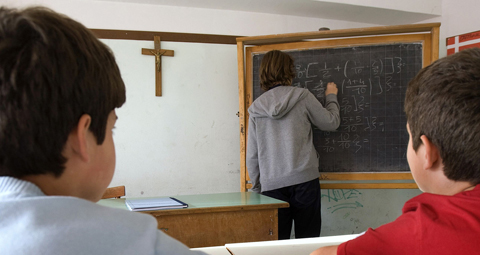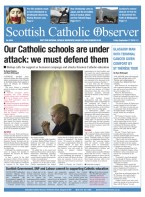BY Daniel Harkins | September 27 | ![]() 0 COMMENTS
0 COMMENTS ![]() print
print

Midlothian parents concerned Catholic schools are being singled out for closure
A parent teacher council at a Catholic school has hit out at Midlothian Council for ‘singling out’ the Catholic school sector as it moves forward with plans to close and merge schools to save money.
Earlier this year, the Catholic Observer revealed that Midlothian Council was considering closing Catholic schools as part of plans to plug a £7.4 million funding gap.
Midlothian Council announced the plans in a ‘Financial Strategy’, with one proposed ‘saving measures’ including a ‘consultation on the development of a strategy for denominational school provision across Midlothian.’
The strategy document stated that ‘should the outcome of this consultation be a decision to close school(s)’ it would ‘move to statutory consultation on the closures’ and adds that ‘the closure of certain school(s) would achieve savings.’
All of the council’s eight denominational schools are Catholic, including seven primaries and one secondary.
Last month, three meetings were held at Catholic schools as part of the council’s ‘Informal pre-consultation on denominational education.’
In addition to maintaining the status quo, the consultation is proposing the merger and closure of a number of Catholic schools as options.
Concern
The parent teacher council at St Matthew’s Primary in Midlothian has since raised concerns over proposals to close the school and the council’s wider review of Catholic schools.
“It is… of significant concern, that work continues towards potential closure of St Matthew’s RC Primary and other Roman Catholic schools within Midlothian, with no financial basis for doing so,” a parent teacher council report states.
“Why has a simultaneous exercise not been undertaken for the non-denominational schools across Midlothian given there are 26 primary schools in addition to the seven Roman Catholic Primary Schools within the Midlothian primary school estate?”
Singled out
In a statement to the Scottish Catholic Observer, the parent teacher council said that the council should be looking at the authority’s full schools estate, adding that ‘the fact that just the Catholic school sector is being reviewed would certainly suggest that we are in fact being singled out.’
“The denominational review has no real basis as far as we can see. It seems it’s part of a bigger cost cutting exercise and no other good reasons have been given for this,” a spokeswoman said.
“It would seem that our children’s better interests, our communities’ better interests, are being over looked for nothing more than cost-cutting reasons.
“I am a Catholic parent, I can comfortably speak for the fellow Catholic parents when I say [we feel unfairly treated]. Why are we only looking at Catholic schools? Surely it is all schools or no schools?
It would seem fair to look at every school together then consider any closures/mergers etc.”
Statistics
Midlothian Council claim that the ‘numbers of Roman Catholic children attending’ Catholic schools in the local authority is ‘reducing.’ However the council failed to provide the statistics to support this when asked by the SCO in February.
A spokesperson for the Church previously said that the ‘local authority should review their entire educational estate and not just Catholic schools.’
A Midlothian Council spokesman said the dates for the formal consultation have yet to be set.
“Using the feedback, comments and views gathered in pre-consultation, we will now start to develop viable models of delivery that will be the basis of further pre-consultation and engagement,” they said. “Full formal consultation will begin after this and is likely to be early next year.
The spokesman said further consultations ‘will be carried out as part of the Learning Estate Strategy 2017-2047 and will include both denominational and non-denominational establishments.’
The spokesman added: “We are required to formally consult when changes to the school estate are proposed which involve adding, removing or changing the location of stages of learning. As the fastest growing local authority area in Scotland, we have a learning estate strategy in place to help ensure we can accommodate growing pupil numbers to 2047. That means building new schools, refurbishing existing schools and changing catchments, so consultations have and will continue to be required for many of the schools in our estate.”










